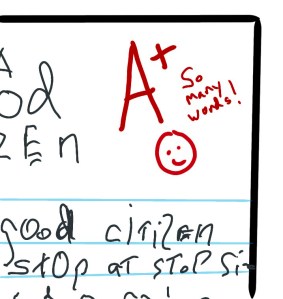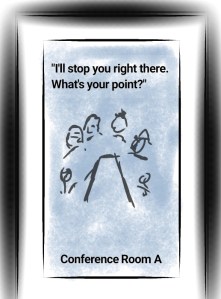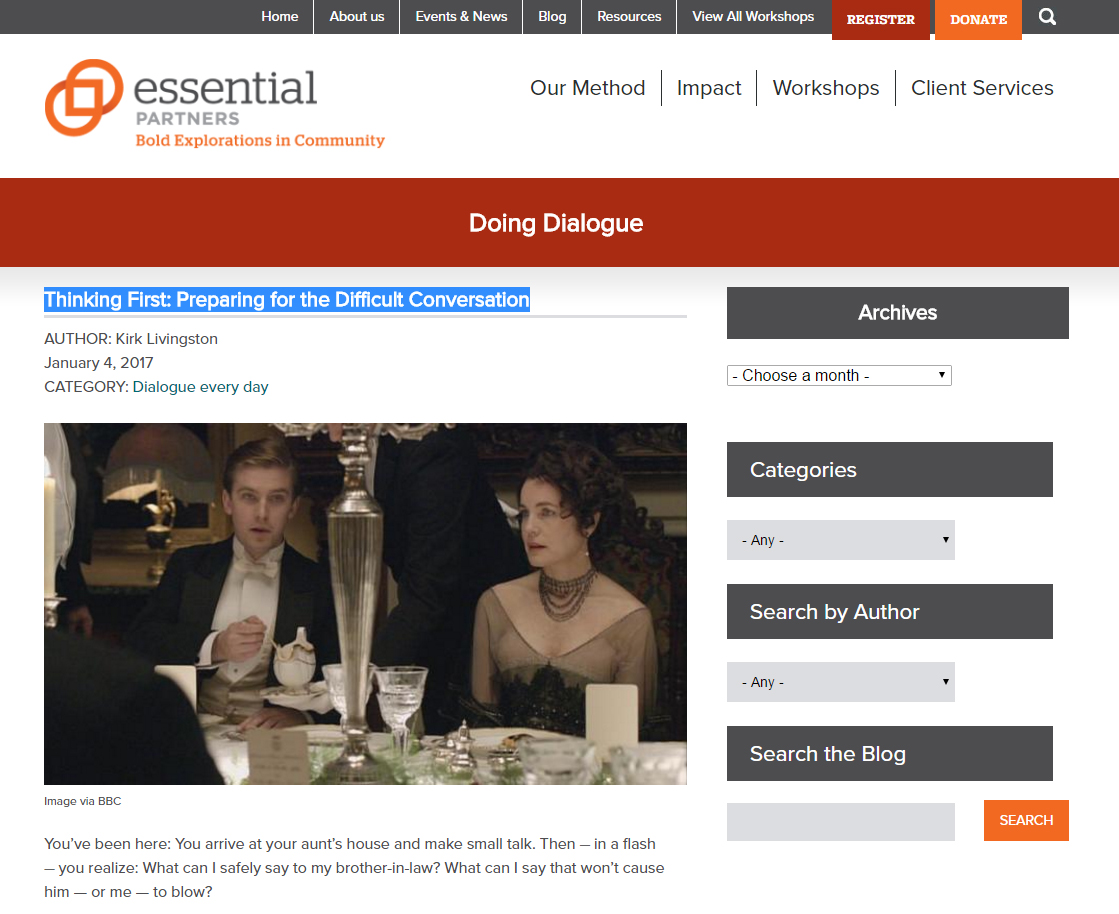Archive for the ‘conversation’ Category
Less Said: Focus Beats Volume
Hey, You. With the Talking Stick.
In grade school I filled pages with my scrawling, hoping Mrs. Wheeler would search out the best bits and award me the “A.”

First Grade.
It turns out that later in life most casual readers—along with editors and colleagues and bosses and clients and you and (even) me—would rather not read through my brain dump, thank you. Who’s got time to hunt for sensical bits among paragraphs of nonsense?
Sometimes students still send me lots of words even though I put a low limit on the word count. Why did they do that? I suspect it is an old habit that operates in the background. That habit is to keep writing or talking with the hope that something apropos will pop out as they think it through. It’s a holdover from those early school days.
But producing lots of words is also a thing we do with our friends in conversation. That’s how we process life: we talk through the crazy thing that happened on the way home to try to make sense of it. We discharge armies of words to describe and annotate and react, all to make meaning. Some of those words stick and our friend was kind enough to listen and tell us what we just said, so now we know what it meant too.
But when some more formal assignment pops up, less is more. Getting to the point and illustrating it so I can understand the information and the emotion you feel—that’s worth 23 pages of single-spacing, 10 pt. Times New Roman blather. That’s why we sort through our main points and prioritize them and then cut them back again. That’s why we ask what does my audience know and what do I want them to feel? That’s why I create a context they can hear.

First Job.
Last night I went to a modern dance event where at the beginning, in utter silence, the dancer slowly rotated and looked at every member of the audience—it must have taken 90 seconds. It was riveting. The space she created with that slow move wrenched every audience member from whatever hubbub they just came from. She created a space where the audience could (finally/actually/really) hear and see what this troupe would do.
We can create space and context with our words, whether spoken or written if we choose to.
Next time you have the talking stick, do everyone a favor and say only the top three things. Or even only the most critical thing. Then sit down. Even Mrs. Wheeler will give you an “A.”
###
Dumb Sketches: Kirk Livingston
“How Can I Help You?”
Hungry for Power Vs. Repairing the World
This question is an invitation—a beautiful invitation.
If you ask me how you can help, I have an immediate gut response: “Yes! Wait. What do I need right now?” Your question makes me an active participant in my life. The question reminds me I have choices to make about my needs. Do I need someone to hold a door or a wrench or a flashlight? Do I need a kick in the butt or a power nap?
What I need right now depends on what I am trying to do at this moment. But longer term, what does an employee need from a boss to do her job? What does a student need from an instructor to apply these writing lessons to his life? You can see the question initiates a call and response—like most everything with communication. A question that needs an answer. A draft followed by a revision.

From Christian theology, I might call the question an artifact of kenosis, that notion of self-giving that is so hard for us power-hungry humans to live out. Then again, maybe it is less an artifact and more an aspiration. Maybe the question is a statement about the person I hope to become: caring and thoughtful and using my time and attention to help you reach your goal. But still aspirational, because I have a feeling you may actually tell me what you need. And then I have to put down my book or turn off the TV or be late to work to help you.
No matter how you look at it, the question asks you to know something about yourself and about your journey through life. What do you need to move forward in your journey right now? Back to theology for a moment: The psalmists who wrote the Songs of Ascent (Psalms 120-134 in the Christian Bible) knew to query the creator and to articulate their need, whether for food or stability or growth or to beat up enemies. These authors (and generations of people who pray) had the sense that the Holy One was waiting in the wings with lovingkindness (“chesed”). They (the authors along with the many who pray) made a career of depending on that offer of help.
Maybe our use of the “How can I help you?” depends on the psalmist’s impulse. We thwart our own power-hungry instincts when we ask it of those who have no chance of moving us forward. But we ask it because of the kind of people we want to be and because we believe there is a deep well of chesed out there.
Maybe we ask “How can I help you?” because we are weary of constant rage and yearn for a vocation of repairing the world.

Morris dancers on break from repairing the world.
###
Image credits: Kirk Livingston
Persuade Me
But Not With Your Dumpster Words
Academic journals are near the top of our list for credible sources of information. The work of Retraction Watch (along with Professor Carl Elliot’s snarky Fear and Loathing in Bioethics) has helped me understand that peer-review processes are fallible and can be gamed. Still, the intent of providing transparent work that smart people can discuss seems a solid route to truly reliable knowledge.

Promotional copy is on the other end of the continuum. As a copywriter, I try to use reason and logic to engage readers. And I’ll bring in emotion to tell my client’s story. But I want a discussion, not a manipulative parlor trick. Good copy addresses humans with reason, logic, and emotion that honors our humanness without resorting to manipulation. After all, that’s how humans talk with other humans.
A Continuum of Believability
Further down the continuum of believability is sales talk. It’s the kind of stuff we hear from the used car salesman and telemarketers or our 45th president: “best,” “tremendous,” “today only,” “you’ve never seen anything like this.” These are dumpster words that signify active lying or passive disinformation. You can tell by the lack of specificity. The words are in-credible, that is, not believable and we should turn away from them.

Somewhere in the middle of the continuum of believability are persuasive commentaries and editorials that are biased and meant to convince. Their authors acknowledge their bias straight on and early in their communication. We see their bias and take that into account as we read. Even nearer the middle of the credibility continuum is instructional words that aim to help the reader accomplish something. That’s what my current class is about—helping readers take some action out in the world.
If we are aiming toward credibility in our communication (a typical goal for sane people), we’ll pull from the tools and building-block thoughts that are well-vetted with facts and citations from other credible sources. We’ll also grab from the piles of words that invite further reflection and discussion. The more credible we want to be, the more we’ll direct our typing hands away from the sales talk words, those dead-end, short-circuiting, dumpster words that deceive and misdirect as they are spoken or written.
Smart People Discuss for Credibility
It’s how we sort most everything in life. By talking together about a book or a movie or a social problem or a new idea, we can often get to credible and truthful statements. Statements that we can believe and act on. But to get to that place of belief, we need to think critically about the pop-up slogans and pre-conceived notions that our ideology or brand-preference have placed in our brainpans. If we resist those clichés and talking points and instead look for words from our own experience, no matter how messy or awkward, we have a chance of getting to the truth.
Credible information withstands questions and discussion by smart people. Credibility is a way forward.
I am eager for our culture to develop a taste for credibility.
###
Image credits: Kirk Livingston
Thinking First: Preparing for the Difficult Conversation
Check out my guest post on the Essential Partners blog:
http://www.whatisessential.org/blog/thinking-first-preparing-difficult-conversation
I Thought of You the Other Day (DGtC#32)
Why are some things worth saying?
Next to the sound of your name, nothing grabs your attention like somebody saying they were thinking about you. You listen closely to what comes next because it holds a personality clue.
Go on—please continue to tell me what charming character trait/hideous character flaw you thought of.
It turns out the stuff that bubbles up through memory is the most critical content to say to your wife at dinner, or your kids at Christmas. Or your colleague. Interestingly, we remember this thing as we face our person. The reminder pops when your wife/kid/colleague makes that casual remark they always make about that pet topic. And then gears turn deep down in your brain-pan and the reminder careens drunkenly down the thought-chute to your mouth. And you can hardly swallow that bite of House Lo Mein, so tremendous is the pressure to say this thing.
Because you know they will laugh. And it will be a moment—a shared delightful moment.
I’m a note-taker. Constantly writing in books (books I own, mind you). Regularly setting reminders in Evernote. Forever reaching for a scrap to jot something. And I refer to my notes. But increasingly I wonder whether my notes harbor the best topics for conversation. I wonder this for the same reason that school lectures are so very tedious: Hearing from someone’s notes or pre-thought ideas is so boring. The very opposite of remarkable.
It’s the stuff we remember as we sit in conversation that matters most and makes a difference. We take notes and write things down to remember for later, but the most critical stuff bubbles up on its own–that’s the remarkable stuff. Maybe our note-taking has raised the importance and we are more likely to remark.
So by all means make your notes—especially as the holidays bring friends and family you’ve not seen for some time. But remember that the magic happens in the moment of conversation, which is a moment of connection. Chances are good your remark will be different from the note you made.
###
Image credit: Kirk Livingston
Why I’ll Vote for Clinton
What will your vote say?
Here’s what I know 3 days before our vote.
Republicans:
- Put forward a hate-mongering, racist, misogynist, [former?] sexual predator whose speech consists largely of bald-faced lies (in one week he spoke an untruth every 3.25 minutes) (PolitiFact truth-o–meter) with no record of public service
- The Republican candidate has shown little interest in understanding nuanced, global issues and little curiosity for anything beyond his own image.
- The Republican candidate boasts of bending laws to fit his personal goals and ambitions and promises to jail his political opponent if elected.
- The Republican candidate demonstrates confusion about the difference between the office of president and the office of absolute monarch. The Republican candidate may think he will be crowned king.
- Relinquished leadership by standing silently as their candidate uttered fictions and wove lies day by day.
- Republican leaders hid and then gradually agreed with many of the lies and fictions their candidate uttered.
- Republicans show deference to the Republican candidate as if he may be crowned king.
- Spent years obstructing needed legislation, including refusing to vote on a supreme court candidate with bipartisan support.
- Relinquished the notion of smaller government by agreeing to a far great burden on government spending that their candidate has put forward (“I will build a great wall”).
- Generally seek to protect the interests of big money over the needs of common people
Democrats:
- Put forward a well-qualified candidate with a lifetime of public service
- Put forward a candidate whose speech has veered in and out of truth (PolitiFact truth-o–meter), though not to the extent of the Republican candidate.
- The Clinton Foundation seems to have problems and has been less than transparent
- Clinton’s mistruths are Foshay-sized compared to Trump’s Burj Khalifa of outright lies

- The Democratic candidate shows skill in dealing with nuanced global issues
- The Democratic candidate shows respect for women and the poor and the sojourner.
- The Democratic candidate has been good friends with big money interests, which is troubling.
There are other candidates, but third-party candidates rarely make a showing in the vote.
Litmus-Test Voters
Some reading this will subscribe to the notion that pro-life is the litmus test for voting. And while Trump claims a pro-life stance at the moment, he has held both views at different times (which is true of a great many of his current convictions). Given Trump’s commitment to saying whatever nonsense enters his brain, it is not clear that he will stay with the convictions he currently uses to woo Evangelicals and Catholics.
One question litmus-test voters may ask is whether anti-abortion is truly pro-life. There are many more pieces to consider outside of an abortion procedure, like care for children and funding for women’s health, like our treatment of the poor and the sojourner and the refugee. A consistent pro-life stance will look at systemic roots of poverty and care for people rather than brushing them off as not the job of the government. A consistent pro-life stance would put plans in place for the living as well as the not-yet-living.
Voters Holding their Nose while Voting Trump because of Supreme Court Nominees
Some reading this will say they are not so much voting for Trump as they are for the next Supreme Court nominee. To you I say, you are still voting for Trump and saying “Yes!” to the Trump brand of lies/hate/genital-grabbing and bullying. Plus—do you really believe a man who changes his convictions so easily and has zero attention span will remember what he vowed months ago? Seems unlikely.
Bill Maher got it exactly right recently when he described the current evangelical fascination with Trump. After years of saying “character counts,” evangelicals abruptly said character doesn’t count when it’s a guy we want to win. Maher’s charge of hypocrisy is apt and lands squarely where it should.
Either-Or Decision
U.S. citizens must make an either-or decision about a leadership question that is far from black and white. I will vote for Clinton because she is qualified and can work with our present system of governance. I am not pro-choice, but I see pro-life as much larger than anti-abortion.
I will not vote for Trump because he is unqualified, demonstrates disrespect for anyone who his not him, proudly retains profound ignorance on a host of issues along with an unwillingness/inability to learn. Trump has demonstrated that he is more than willing to summon hatred and violence to serve his interests in ascending to the monarchy he desires.
My Vote Says:
- Hillary Clinton will a make positive contribution to our nation’s progress and will be a steady hand at the tiller. I’m not happy about her lies and lack of transparency and big-money connections, but she is able to do the job.
- Current Republican methodologies of obstructionism and gross lies and silence in the face of gross lies must be met with a vote against them at every opportunity. And that is my plan.
Commence the hateful rants and disowning/dismembering remarks below.
###
Louis L’Amour and Writing for Life from Life
My new dead friend teaches on knowing
I do not read westerns, typically.
But Mrs. Kirkistan, with her eclectic tastes, put L’Amour’s autobiography into my [sweaty] hand. Education of a Wandering Man is a revelation.
Two things right away:
- L’Amour was an autodidact like few others. He had little formal education—he quit school at 15 to travel. His real education started with knocking about as merchant marine, going to war, wrangling cattle, going hungry between jobs, boxing—and reading. Especially reading. L’Amour’s hunger to know is infectious.
- L’Amour’s hard-knocks education contributed to his readable writing. That’s my hypothesis: life experience makes for more readable writing. And vice versa.

L’Amour’s life (1908-1988) seems a rebuke to the supposed schism between “academic” and “practical.” If you read Education of a Wandering Man (and I hope you will) you will find an articulate man who read widely and used very approachable language to package his thoughts. But it wasn’t just easy-to-read language that was his genius; it was the layering of language into a story. L’Amour is a storyteller who is hard to resist.
His is not academic writing, of course. But it is thoughtful writing—especially when you find out what he was reading when he wrote. His simple stories start to go deep.
In his autobiography L’Amour named the books that had been influential for him. There are scores of them—73-120 books per year, from 1930 to 1937—and he named them one by one. But these are not the books listed on a college syllabus (though some are, to be sure). From Voltaire to Nietzsche to Schopenhauer to Mann to O’Neill to Joseph Conrad And lots and lots of fiction These are the books that piqued his interest as he lived his life. And that is how his autobiography is organized: the books he read while he was living this or that particular chapter. Reading about the West as he worked on cattle ranches Reading Nietzsche and Schopenhauer as he boxed. Reading ancient myths and stories as he sailed. Reading about the West later as he wrote frontier stories. (I may be off in the details about when he read what—there were so many mentions and so many chapters in the guy’s life).
Education Not a Given
One thing that stands out is the focus of his education. It was not to acquire a degree. It was to move forward with what he was intended to do—as best he understood.
Stay with me here: L’Amour read to see how stories worked.
Yes, he got lost in books. Yes, he loved learning. But his learning was always aimed at assembling an image of how the world worked. He was of a time when many readers were doing the same thing, because education was not as available as it is today. But there were books.
Here’s the point: L’Amour told stories, and all his philosophical thinking about life is bound up in the stories. He is not pedantic (at least in this book), but thoughts about life roll out of the characters in the stories. This is a revelation because much of our education (and my education) are all about pedantics: laying lesson out in neat arguments. One could memorize these arguments. In fact, you have to memorize them because they slip away the moment you turn your eyes. That’s because they are not moored in the emotion of real life.
L’Amour, on the other hand, had stories pop out of him of all sort of real (ish) people doing real things in life because of their underlying beliefs.
Oral and Writing Should Talk
The big revelation that L’Amour gave me was that precisely because he was educated by stories and for stories (he had to captivate audiences again and again in the different chapters of his life), his writing fit quite naturally into an oral rhythm. No big words. No long sentences. Ideas were easy to remember because he wrote them with stories, and we remember what that philosophy looks like without the pedantics.
Because of L’Amour’s example, and because of my own failures (plus a few minor successes) with communicating and expressing detail, I’m starting to move toward copy that can be said. I’ve always advised copywriting students to read their sentences aloud to see if they make sense. In the end, it’s quite possible that what we hear and what we gather from what we hear, is the standard for engaging another person, as well as the standard for knowing anything.
Knowing seems to pass through our mouths, in particular.
###



